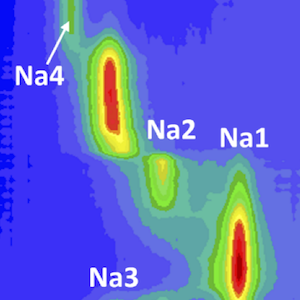Abstract
The Na-superionic-conductor (NASICON) Na3V2(PO4)3 is an important positive electrode material for Na-ion batteries. Here, we investigate the mechanisms of phase transition in NaxV2(PO4)3 (1 ⋜ x ⋜ 4) upon a non-equilibrium battery cycling. Unlike the widely believed two-phase reaction in Na3V2(PO4)3 – Na1V2(PO4)3 system, we determine, for the first time, the structure of a recently reported intermediate Na2V2(PO4)3 phase using operando synchrotron X-ray diffraction. Density functional theory calculations further support the existence of the Na2V2(PO4)3 phase. We propose two possible crystal structures of Na2V2(PO4)3 analyzed by Rietveld refinement. The two structure models with the space groups P21/c or P2/c for the new intermediate Na2V2(PO4)3 phase show similar unit cell parameters but different atomic arrangements, including a vanadium charge ordering. As the appearance of the intermediate Na2V2(PO4)3 phase is accompanied by symmetry reduction, Na(1) and Na(2) sites split into several positions in Na2V2(PO4)3, in which one of the splitting Na(2) position is found to be a vacancy whereas the Na(1) positions are almost fully filled. The intermediate Na2V2(PO4)3 phase reduces the lattice mismatch between Na3V2(PO4)3 and Na1V2(PO4)3 phases facilitating a fast phase transition. This work paves the way for a better understanding of great rate capabilities of Na3V2(PO4)3.
